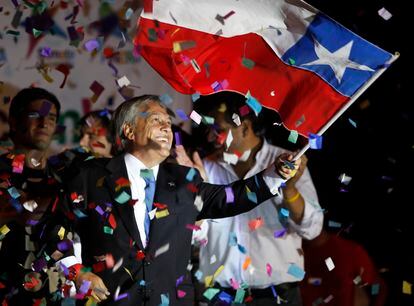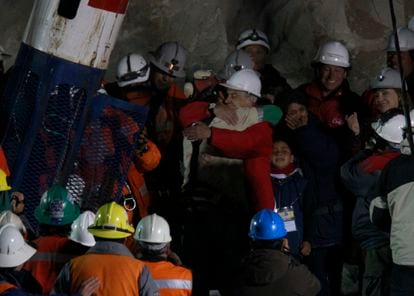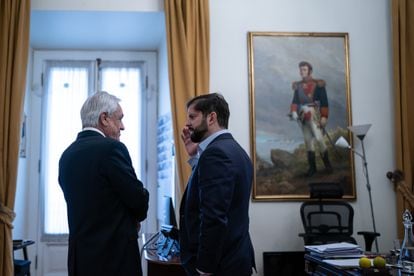The person who died this Tuesday afternoon in a plane accident, when the helicopter he was piloting fell into Lake Ranco, where he always vacationed in the south of Chile, was twice president of Chile in this 21st century. He was a democratic leader, as the Minister of the Interior, Carolina Tohá, recalled when confirming the news, which she highlighted the way in which Piñera dedicated his life to public service. He was a tireless, risk-taking politician, he liked to bet and win. Some of his first electoral campaigns used the slogan the locomotive and, to a large extent, that image represented him both in his life as a politician—he was a parliamentarian, president of his party, National Renewal, and then president—and in business.
Sebastián Piñera Echenique, 74 years old, was a man who had his mind on big things, not on subtleties. When he found a shirt that he liked in the store, he would buy a dozen of the same design. Ties were usually given as gifts. Until before arriving at La Moneda for the first time in 2010, he did not make his suits to measure, so they were almost always wide and long. His peculiar style—informal, careless, avaricious or austere—revealed a character whose head was much less focused on daily affairs—such as clothing—than on his two great passions: politics and business. But he had a passion: flying. In Ranco, where he had a house in a beautiful area called Bahía Coique, people knew when it was Piñera who was flying over the fresh waters of the lake because they knew his helicopter. At this time he did it almost daily with family and friends.
74 years old and married since 1973 to Cecilia Morel – with whom he had four children and many grandchildren -, Piñera combined public issues with his companies for years. At the end of the seventies he obtained representation for Chile for credit cards and, since then, his consecutive businesses have grown in ambition and success. He was the main shareholder of the airline Lan Chile (currently Latam), the television channel Chilevisión and Blanco y Negro, the company that manages one of the most popular soccer clubs in the country, Colo Colo. But this intersection between money and politics was not free for Piñera: both his ability to earn money and to use the loopholes to his advantage was his main Achilles heel in his political life.
Piñera was a rich man: he has a fortune estimated by Forbes at about $2.9 billion, the fifth largest in the country, according to the 2023 ranking. But he was a first-generation millionaire. Born in Santiago de Chile in 1949, he was the third of the six children born to Magdalena Echenique and José Piñera Carvallo, an engineer and diplomat who educated his children thanks to his work and who was the founder of the Chilean Christian Democracy, the party that For decades he represented the middle classes. The reasons why the former president did not join his father's party and ended up joining the right have never been entirely clear. The truth is that Piñera tried without much success to captivate that moderate center in which he sometimes seemed to feel more comfortable than in his own sector.
He was never a traditional Chilean right-winger, historically more conservative, which is why in his own ranks there are those who viewed him with a certain distrust. He is an average Catholic. He felt comfortable visiting former President Barack Obama in Washington — as he did in September 2017 — or when he boasted about his closeness with the Frenchman Nicolas Sarkozy or the British David Cameron.
Rise in the opposition
For the 1988 plebiscite that sealed the departure of the dictator Augusto Pinochet, unlike the rest of the right, he voted for the option of no to the continuity of the military Government. In democracy he was a senator between 1990 and 1998. In the midst of the transition, with the center-left Concertación in power, he began to become one of the main figures of the opposition. In 2005 he tried to reach La Moneda without success, because he lost to Michelle Bachelet. In 2009, his second attempt, however, he achieved a historic victory: defeating former president Eduardo Frei Ruiz-Tagle, he became the first right-wing president since the return to democracy in 1990. His predecessor, Jorge Alessandri, had been elected decades ago, in 1958. Piñera, then, was finally the one who broke the hegemony of the left in Chile.

He led a Government that, in some way, followed the path of the four center-left Administrations that had previously governed the country. He did not make a turn to the right—as his own sector would have liked—and his administration was marked above all by an emphasis on management. Having had the south-central area of the country practically destroyed due to the devastating earthquake of February 2010, Piñera had to focus on rebuilding.
The rescue of the 33 miners who lived 700 meters underground for 69 days attempted to be the symbol of a Government that—with a certain arrogance—tried to show that with business logic things could be done well. The student revolution of 2011, however, tested Piñera and his people politically. She had a reputation for being smart and with a certain taste for protocol outings, like when she sat at Obama's desk in the White House to take a photo. Or like, when in the midst of the outbreak of 2019, she took a photo alone in the epicenter of the protests, taking advantage of the curfew. Master and doctor in Economics from Harvard, his strength was not necessarily soft taxes, such as sympathy or closeness with citizens.

He was impulsive, uncontrollable – even for his advisors and his trusted people – but prepared and experienced, as his adversaries recognized him.
In 2017 he re-nominated for the Government and won against a weakened center-left without strong leadership. For the second time, Michelle Bachelet, a socialist, who this Tuesday afternoon expressed her condolences, gave her the presidential sash. Between them they ruled for 16 years.
But that second Administration was extremely complex. In October 2019 he had to face the social outbreak. There were demands and accumulated unrest, but it was Piñera who was in La Moneda and both he and his Government were a target of rage. In days when violence in the streets endangered the young Chilean democracy, the left-wing opposition sought to remove him from power through a constitutional accusation in Congress, accusing him of human rights violations. But it was not Pinochet who was in front but, as Tohá recalled this Tuesday, a democratic president. He never abandoned his commitment to democracy and even his harsh adversaries recognize that today.
Only the pandemic calmed the streets and he is recognized for managing the health emergency, because his business talent made it possible to negotiate vaccines with laboratories before anyone else in Latin America. In the worst months, Chile was the envy of the region due to mass inoculations of the population.
But, as expected, in March 2022 he handed over command to a president of a different nature, Gabriel Boric, from the new left of the Frente Amplio, with whom he always had a strained relationship. Except for the commemoration of the 50th anniversary of the coup d'état, last September, when Piñera did not even hesitate to join the activities organized by La Moneda. He was not spiteful and knew how to take advantage of opportunities.

Less than two years after leaving La Moneda, he did not completely abandon the idea of returning to the Government. His public valuation rose week by week and Piñera was aware that the right has great options to return in 2026. This Tuesday, when speaking about his predecessor, Boric said that he will say goodbye with a state funeral, two days of national mourning and recognized him as someone who “contributed from his vision to building great agreements for the good of the country and was a democrat from the beginning.”
Subscribe here to the EL PAÍS Chile newsletter and receive all the key information on current events in the country.
#Sebastián #Piñera #millionaire #politician #risk #win
